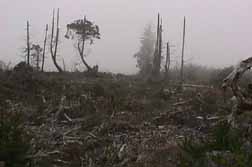|
|
 |
|
|
 |
The timber industry says, "Measure 64 is actually a ban on almost all timber harvesting in Oregon." What does "almost all" mean to you, in common sense terms, in a percentage? When I read that, I think 90-95%. But in the smaller print of this publication I find that they mean 60-65%. And while I certainly don't claim to know what the timber industry's plans are, should 64 pass, I do wonder if they have a motivation to exaggerate this number.
Of course, any loss of jobs and income is regrettable. But all that will be going away before long in any case, at the rate we're destroying the forests. Better to slow down now while there's still something left.
The timber industry complains, "Even damaged, diseased or dead trees could not be harvested." Does anyone believe that this industry that's fighting to continue clearcutting would have any interest in being limited to harvesting damaged, diseased and dead trees? Or that, if this measure made such exceptions, the timber industry wouldn't find a way to use such a loophole to continue business as usual.
The timber industry says, "Under the measure, pesticides could not ever be used in Oregon forests, even in times of major insect epidemic or emergency." 1) As I read the measure, it specifies "chemical pesticides" so that the safer, more effective, but more expensive biological controls could be allowed. 2) Chemical pesticides work only in the short run. Some insects survive, develop pesticide resistance, and come back worse than ever. 3) In their TV commercials, they have a forester claiming that she knows how to treat a variety of pests, including the gypsy moth on the list. On the East Coast, they've been battling the gypsy moth with pesticides for over 100 years. Ask them about how well that works.
Read Rachel Carson's Silent Spring. Yes, if this web site doesn't do anything else, let it inspire you to read that book. It was written some decades ago and my first reaction was, "Oh, but we don't do that anymore." Actually, every year, we come up with more poisons that are mass-produced and poured into our environment before we understand what they'll do.
The timber industry says, "Wild fires would increase in both size and intensity. Brush, which provides fuel to forest fires, could not be cleared with pesticides." Excuse me? How do chemicals which kill bugs clear brush. Even if they mean "herbicides" they only act to prevent growth, not clear it. Doesn't the main fuel for fires come from annual growth? And on their web page, the timber industry claims that they only apply herbicides once every 30 years. Common sense tells me that a living forest with trees providing shade and collecting moisture is much less of a fire hazard than an area that's been clearcut, even with a replant and sprayed with herbicides.
The timber industry web site states, "The herbicides used in forests are the same as those used in home gardens and they pose no health risk to workers or animals." 1) Common sense tells me there's a big difference in environmental impact between stuff applied with a spray bottle to a few weeds in the lawn and stuff poured on hundreds of acres, even when it's the same stuff. 2) I'm not all that convinced these chemicals are so harmless. They thought DDT was harmless for many years, too.
The timber industry claims that, "Clearcut harvesting is an environmentally sound, scientifically effective means of removing mature conifers prior to planting." My response:
 more pictures
more picturesThe claim that clearcutting is environmentally sound is so ludicrous that it leaves me speechless.
The timber industry says, "Measure 64 takes forestry practices out of the hands of scientists professional foresters and wildlife biologists and puts them in the hands of bureaucrats and the courts." Put another way, it takes decisions out of the hands of people (timber industry managers) who must answer questions from stock holders about the bottom line and this quarter's profits and puts them in the hands of people (politicians and bureaucrats) who must answer questions from voters about their quality of life, both now and many years from now, and about the kind of Oregon, and, indeed, the kind of world, that will be left to our children and grandchildren.
some philosophy | more from me | comments from Alan |
![]()
All quotes from the timber industry
are taken from publications of the "Healthy Forest Alliance." As of
this writing, it looks like the same information is on their
web
site.
![]()